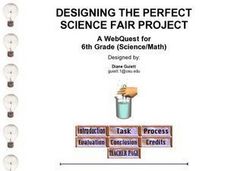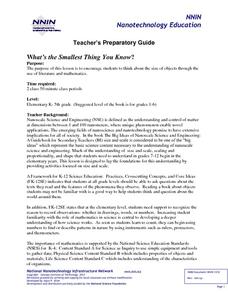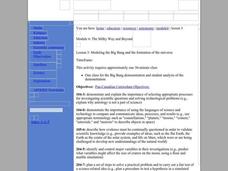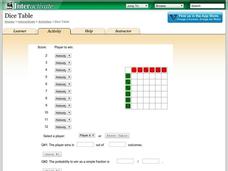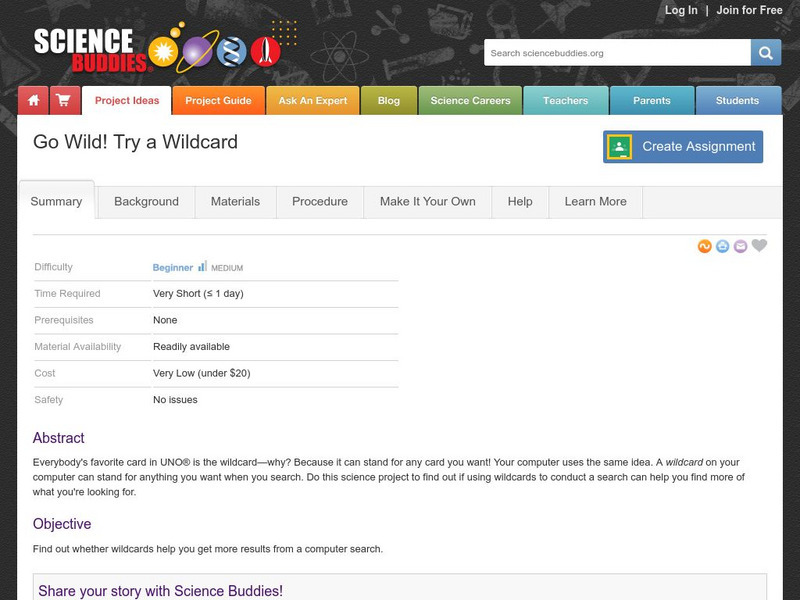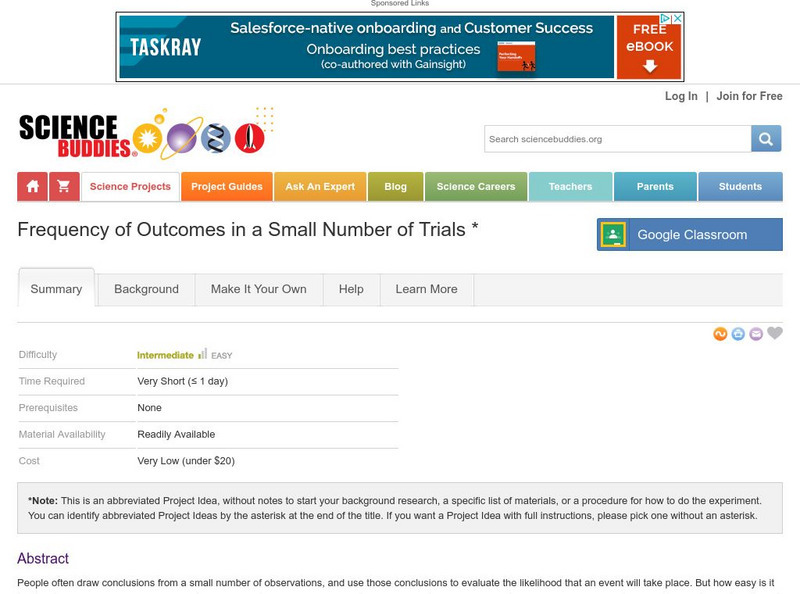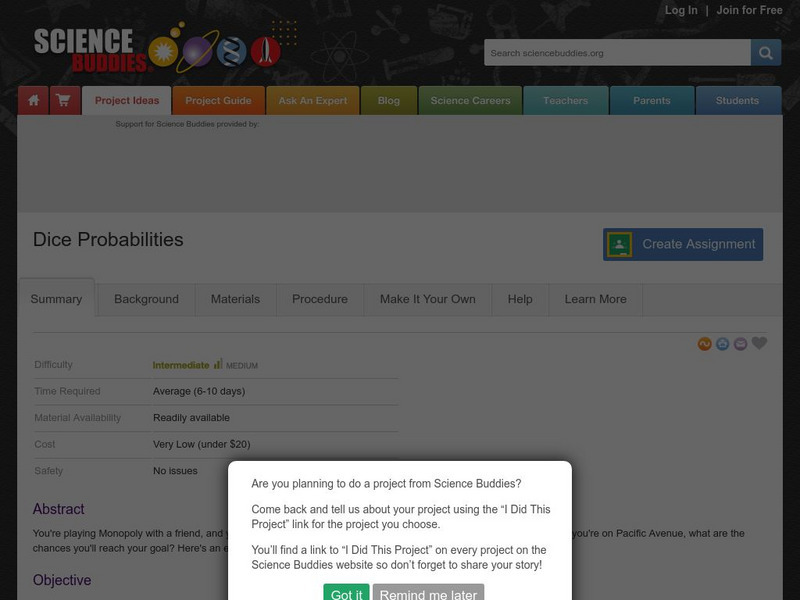Space Awareness
What is Time?
Does it ever seem like time is slipping through your fingers? Model the passing of time with an hourglass activity in which individuals determine whether hourglasses are the most efficient way to measure time.
Curated OER
Designing the Perfect Science Fair Project Webquest
Sixth graders examine the Scientific Method and define their topic of interest. Students familiarize themselves with how to utilize their resources and create note cards. Students create their written report and display of their...
National Nanotechnology Infrastructure Network
What’s the Smallest Thing You Know?
Elementary learners listen to a story, then sort objects from largest to smallest at six different stations around the classroom. Adaptable for a large range of age and ability groups.
Curated OER
The Big Bang Theory
Students will use scientific reasoning to formulate ideas about the formation of the universe using the Big Bang Theory. The use of critical thinking skills is part of the activity and the foundation of the scientific method will serve...
Shodor Education Foundation
Dice Table
Convert a table to probabilities. Pupils set up the winning rules for the sums of two dice. Using the rules, the applet fills out a table showing the winners for each combination. Learners determine the probabilities of winning for each...
Curated OER
Flight Dreams - Folding into Flight
Combine measurement, following directions, physics, and art with one fun activity. Learners read a set of instruction to create three different kinds of paper airplanes. They measure, fold, and fly the planes, and record data and answer...
Shodor Education Foundation
Racing Game with One Die
Pupils roll a die to figure out which car advances on a race track. They determine the rules for each car moving forward and, given the statistics of the winner, compare if it matches their predictions.
Shodor Education Foundation
Algebra Four
Everybody wins when you play Algebra Four. Players solve linear and quadratic equations to earn pieces on the Algebra Four game. Make a row of four pieces and you win the game. But everyone gets practice with solving equations, so really...
Curated OER
Marine Animals: Stranded on the Coast
Students identify marine animals that could become stranded due to coastal features and currents. They plot data on worksheets for locations of sea turtles actually beached or stranded. After plotting their points, they hypothesize...
Curated OER
Designing a Playground!
Students design their own playground equipment. In this design lesson, students take pictures of equipment they like and make a class pictograph of their favorite ones. They investigate the design, research equipment around the world,...
Curated OER
Delayed Gratification
Word problems are great for engaging critical thinking skills, and word problems involving money increase a child's financial literacy. Boost your critical and financial thinkers with a multi-step word problem involving money and problem...
Curated OER
Blowing in the Wind
Pupils compare hurricanes and tornadoes. They write a paragraph explaining how to prepare for a storm. Students give an oral report. They use weather facts to practice math skills. Pupils record observations of a storm.
Science Buddies
Science Buddies: Weathering the Windchill: How Does Wind Speed Affect Objects?
With this science fair project measure the effect of wind speed on how quickly an object cools. The Science Buddies project ideas are set up consistently beginning with an abstract, objective, and introduction, followed by a section on...
Science Buddies
Science Buddies: M&m Math
By using a simple bag of M&Ms, you can conduct an experiment in statistics to determine the frequency of colors in the package. The Science Buddies project ideas are set up consistently beginning with an abstract, objective, and...
Science Buddies
Science Buddies: Wild About Wildcards
The idea of a wildcard allows you to satisfy any condition. The same concept is behind using a wildcard when searching for something with your computer. Do this experiment to find out if using wildcards to conduct a search can help you...
Science Buddies
Science Buddies: Getting More Out of Less : Google Hits and Search Terms
Google is the name of the most often used search engine on the Internet. "Googol" is the mathematical term for a 1 followed by 100 zeros. It's a very large number. This experiment will help you test different search terms and find out.
Science Buddies
Science Buddies: Frequency of Outcomes in a Small Number of Trials
People often draw conclusions from a small number of observations, but how easy is it to draw the wrong conclusion? Here is a simple project that shows the importance of making enough observations before making a prediction.
Science Buddies
Science Buddies: Dice Probabilities
You're playing Monopoly with a friend, and you've already got Park Place and you really, really want to get Boardwalk. If you're on Pacific Avenue, what are the chances you'll reach your goal? Here's an easy project that will show you...
Science Buddies
Science Buddies: The Birthday Paradox
This project shows how mathematical probability sometimes contradicts our intuition. Despite the fact that there are 365 days in a year, if you survey a random group of just 23 people there is a 50:50 chance that two of them will have...
Science Buddies
Science Buddies: Divide and Conquer: Proving Pick's Theorem for Lattice Polygons
If you like to play Tetris then you might like this project. You'll learn something interesting about the mathematics of complex shapes.
Science Buddies
Science Buddies: Throwing You Some Curves: Is Red or Blue Longer?
This a straightforward, but interesting, project in geometry. It is a good first proof to try on your own. You should be able to figure it out by yourself, and you'll gain insight into a basic property of circles.
Science Buddies
Science Buddies: Exploring Fractals
Although fractal images can be intriguingly complex, fractals are more than just pretty pictures. In this project, you'll explore the mathematical properties of the famous Mandelbrot and Julia sets. You'll learn about how these images...
Science Buddies
Science Buddies: Estimation and Population Size
Have you ever wanted to take a short cut? How about when doing your math homework? In this experiment you can learn how estimation can save you time doing math calculations. But beware, some estimations are better than others. Can you...
Science Buddies
Science Buddies: Measuring Up
Measurements are very important for scientists. It is especially important that the measurements be accurate. Think about how important accuracy is when you want to know if you are taller than a friend of yours, every inch counts. In...

